Results
-
£64.99
Antarctica Saga - Mike Hannickel
The arduous and dangerous first journey to the South Pole is skillfully interpreted for young band with ANTARCTIC SAGA. Young musicians love to play programmatic music. They'll imagine Norwegian Roald Amundsen's historic daring feat as they rehearse this compelling arrangement. This piece has loads of potential for cross-curricular work in both history and geography.The arrangement includes exciting optional sound effects, such as the chilling Glass Harmonica effect, which helps students to realize that music can be made in many ways. A reference to the Norwegian National Anthem completes the journey. Musicians and audience alike will love it.Adventure!
Estimated delivery 7-14 working days
-
 £236.00
£236.00Pome symphonique en forme d'ouverture - Paul Gilson
In September 1925, on the occasion of the sixty-fifth birthday of their 'master', seven students of Paul Gilson gathered to form the first composers' collective in Belgian national music history. The members of Les Synthtistes (the Synthetists) are Ren Bernier, Francis de Bourguignon, Gaston Brenta, Tho Dejoncker, Marcel Poot, Maurice Schoemaker and Jules Strens. Their intent is twofold and both theoretical and practical. Les Synthtistes want to distinguish themselves as the 'Brussels seven' by breaking away from the prevailing late-romantic music of their time. Their theoretical aim is to synthesize the modern tendencies in music from 1925 onwards, to connect with the 'acquisitions of contemporary music' and to apply them within balanced and well-defined forms. Their practical goal is to make it easier to find a stage to perform their new symphonic music by uniting. In a period when there is no professional symphonic orchestra in Belgium, apart from the opera orchestra, they compose and transcribe their original symphonic works for wind band. They work together with Arthur Prevost and the Royal Band of the Belgian Guides which grew into a model instrumentation of 85 musicians during the interwar period. Thanks to Prevost and the Guides a unique collection of original, modern music for wind band by Les Synthtistes can be heard on the Brussels concert stages during the interwar period. Because only a few works of this unique, forgotten collection of 75 works were published, this unique canon remained largely unknown. Thanks to a historical study of sources by Luc Vertommen, these works for wind band are now, a century after their creation, made accessible and recorded for the first time.
Estimated delivery 7-14 working days
-
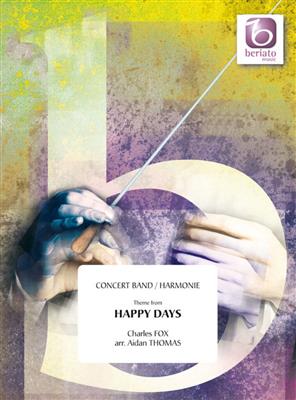 £74.99
£74.99Theme from "Happy Days" - Charles Fox
Happy Days was originally the melody that accompanied the credits of the TV show of the same name during its first few seasons. They both became so popular that the song eventually became the show's main theme in the 1970s and 80s. Happy Days is an upbeat song that people can't help but tap their feet to whenever they hear it. It even reached the top five on the American charts. No one will be able to sit still when your band strikes up this tune!
Estimated delivery 7-14 working days
-
 £123.20
£123.20Rcitatif et Ronde - Francis de Bourguignon
In September 1925, on the occasion of the sixty-fifth birthday of their 'master', seven students of Paul Gilson gathered to form the first composers' collective in Belgian national music history. The members of Les Synthtistes (the Synthetists) are Ren Bernier, Francis de Bourguignon, Gaston Brenta, Tho Dejoncker, Marcel Poot, Maurice Schoemaker and Jules Strens. Their intent is twofold and both theoretical and practical. Les Synthtistes want to distinguish themselves as the 'Brussels seven' by breaking away from the prevailing late-romantic music of their time. Their theoretical aim is to synthesize the modern tendencies in music from 1925 onwards, to connect with the 'acquisitions of contemporary music' and to apply them within balanced and well-defined forms. Their practical goal is to make it easier to find a stage to perform their new symphonic music by uniting. In a period when there is no professional symphonic orchestra in Belgium, apart from the opera orchestra, they compose and transcribe their original symphonic works for wind band. They work together with Arthur Prevost and the Royal Band of the Belgian Guides which grew into a model instrumentation of 85 musicians during the interwar period. Thanks to Prevost and the Guides a unique collection of original, modern music for wind band by Les Synthtistes can be heard on the Brussels concert stages during the interwar period. Because only a few works of this unique, forgotten collection of 75 works were published, this unique canon remained largely unknown. Thanks to a historical study of sources by Luc Vertommen, these works for wind band are now, a century after their creation, made accessible and recorded for the first time.
Estimated delivery 7-14 working days
-
 £87.20
£87.20Guitenstreken-Gaminerie - Theo Dejoncker
In September 1925, on the occasion of the sixty-fifth birthday of their 'master', seven students of Paul Gilson gathered to form the first composers' collective in Belgian national music history. The members of Les Synthtistes (the Synthetists) are Ren Bernier, Francis de Bourguignon, Gaston Brenta, Tho Dejoncker, Marcel Poot, Maurice Schoemaker and Jules Strens. Their intent is twofold and both theoretical and practical. Les Synthtistes want to distinguish themselves as the 'Brussels seven' by breaking away from the prevailing late-romantic music of their time. Their theoretical aim is to synthesize the modern tendencies in music from 1925 onwards, to connect with the 'acquisitions of contemporary music' and to apply them within balanced and well-defined forms. Their practical goal is to make it easier to find a stage to perform their new symphonic music by uniting. In a period when there is no professional symphonic orchestra in Belgium, apart from the opera orchestra, they compose and transcribe their original symphonic works for wind band. They work together with Arthur Prevost and the Royal Band of the Belgian Guides which grew into a model instrumentation of 85 musicians during the interwar period. Thanks to Prevost and the Guides a unique collection of original, modern music for wind band by Les Synthtistes can be heard on the Brussels concert stages during the interwar period. Because only a few works of this unique, forgotten collection of 75 works were published, this unique canon remained largely unknown. Thanks to a historical study of sources by Luc Vertommen, these works for wind band are now, a century after their creation, made accessible and recorded for the first time.
Estimated delivery 7-14 working days
-
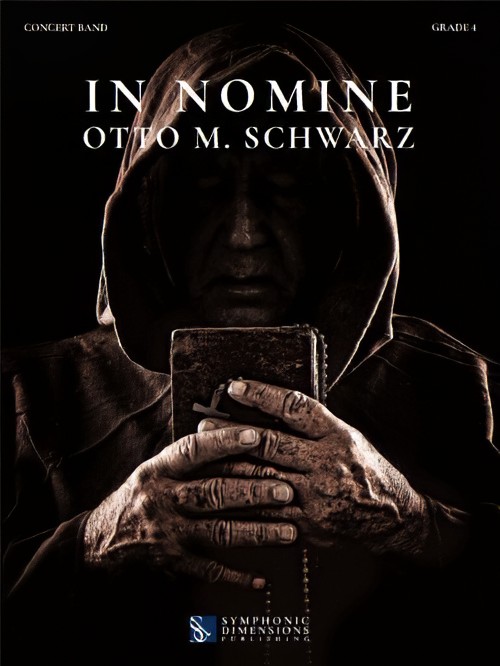 £159.99
£159.99In Nomine (Concert Band - Score and Parts) - Schwarz, Otto M.
How often has something been justified by, declared to be, or blessed as 'in the name of' some cause or other? How can it be that opposing armies and the use of weapons are ever 'in the name of...'? This is a common thread in the history of different faiths. Good was created but evil was committed and all 'in the name of...' This thread is also found in the history of the Premonstratensian Abbey at Wadgassen. The abbey was built in the 12th century on unfertile, desolate moorland, which later evolved into the most powerful religious community in the Saarland. The history of the abbey records quite astounding achievements under the motto desertum florebit quasi lilium ('the desert will bloom like a lily'); but also the harsh treatment of delinquents. The order had its own school, in which children were taught the seven liberal arts (which included music as well as geography and astronomy), but the poor were left to starve outside the abbey walls and were only allowed to eat from the members' leftovers on feast days. The medieval witch trials demanded their pound of flesh, and one group that fell victim were ecstatic dancers who moved wildly to music, which was interpreted as the devil's work. The result: a show trial that sentenced the dancers to death by fire. All in the name of... The year is 1789: Abbot Bordier is in the tenth year of his command. He does not yet know that he is to be the last abbot of an almost 700-year tradition. Not far from the abbey is the French border, which has long been making itself felt with the sound of gunfire, and the brothers continue to keep a nervous eye on it. The first portents of the French Revolution loom, but no one wants to believe it, that is, until the French pound the door down, storm the abbey and come right into the brothers' chambers. In a blind fury, all the pipes of the abbey organ are torn out, icons beheaded with swords and brothers beaten death while numerous buildings are set on fire. The abbey church is in flames. A frantic and desperate escape begins. Abbot Bordier and a handful of brothers make their getaway via the River Saar, adjacent to the abbey, to the neighbouring village of Bous. They survive, but their life, the Premonstratensian abbey, is destroyed. While they flee towards Prague and the sanctuary of the Strahov Monastery, the abbey at Wadgassen is razed to the ground and becomes a stone quarry. The desert blooms once more, however. A few short decades later, a glasswork arises from the foundations of the abbey. As peace returns to the region, it brings jobs and a new vision for its people.Duration: 11.15
Estimated delivery 7-14 working days
-
 £49.00
£49.00Not Tu-bad! (Tuba Solo with Concert Band - Score and Parts)
Your young tuba player is about to have the thrill of a lifetime - a piece with a featured solo just for them! "Not Tu-Bad!" brings your budding tuba star to the forefront, literally, with a clever and fun musical work that highlights just how awesome they are! Give the bottom of your band the chance to stand out and shine with a memorable solo that they'll recall long after the performance is over. And if you don't have a tuba, not to worry-the solo can be played by any low brass or woodwind instrument. Highly recommended! Duration: 2.20
Estimated delivery 7-14 working days
-
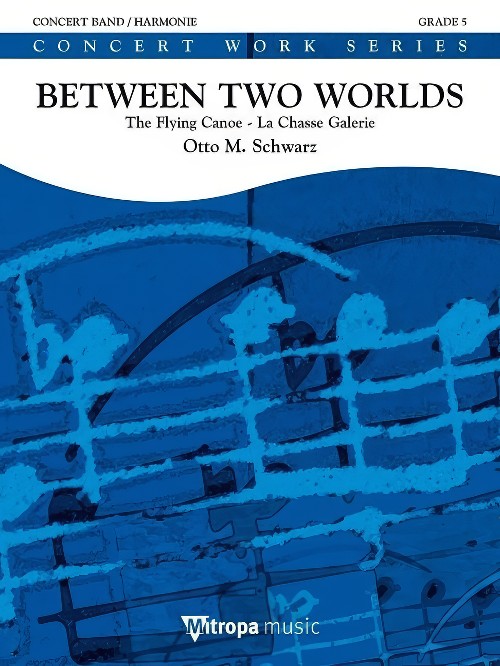 £154.99
£154.99Between Two Worlds (Concert Band - Score and Parts) - Schwarz, Otto M.
This programmatic composition tells the story of a group of workers from a remote forest in the French speaking part of Canada. They are longing to be with their families as Christmas is coming soon and at this time of the year, one can only leave the plant by canoe. According to legend the workers decide to take the flying canoe, but to use it they must close a deal with the devil...Duration: 9:30
Estimated delivery 7-14 working days
-
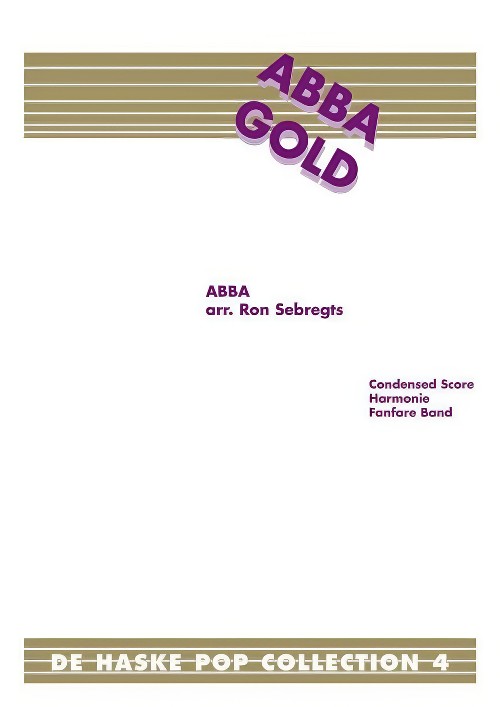 £109.99
£109.99ABBA Gold (Concert Band - Score and Parts) - Andersson & Ulvaeus - Sebregts, Ron
ABBA always wins over any audience. The countless hits of the legendary pop band are as popular today as they were when they first came out. New fans are turning up every day, and who can blame them? Party along with Ron Sebregts' medley!Duration: 6:30
Estimated delivery 7-14 working days
-
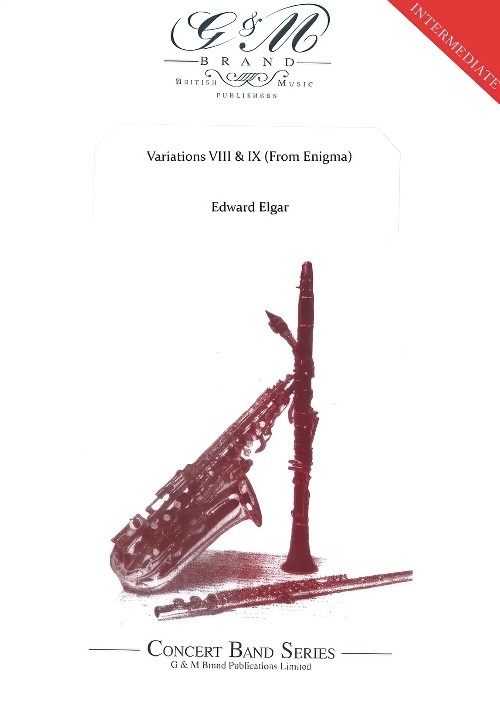 £59.95
£59.95Variations VIII & IX (From Enigma) (Concert Band - Score and Parts) - Elgar, Edward - Brand, Geoffrey
Elgar's Variations for orchestra were written during 1898-9; they are dedicated "To my friends pictured within" Each of the 14 variations is a musical portrait to one of the composer's friends. Over the 17 bar theme which inspired the Variations, Elgar wrote the word ENIGMA. Later he said, "The ENIGMA I will not explain - its "dark saying" must be left unguessed" In Variation VIII W.N. is Winifred Norbury. In 1897 local friends organised a choral and orchestral society for Elgar to conduct. The secretaryship of The Worcester Philharmonic, as the society was called, was shared by two ladies, of whom W.N.. was one She has been described as "very sedate and calm, rather like a kind governess with Elgar, but had a sense of humour - and a laugh, rather like a deep bell". Variation IX Nimrod is Elgar's deeply felt tribute toA.J.Jaeger, his German-born friend who worked for the publisher Novello and Co. His sincere support meant a great deal to Elgar. Jaeger, in German, means "hunter". Elgar concealed this in the nickname Nimrod. The variation has become extremely popular and is often played on thoughtful occasions. In this arrangement, either W.N. or Nimrod can be played alone. However, in the Variations they are linked by Elgar in an inspired manner.
Estimated delivery 7-14 working days
